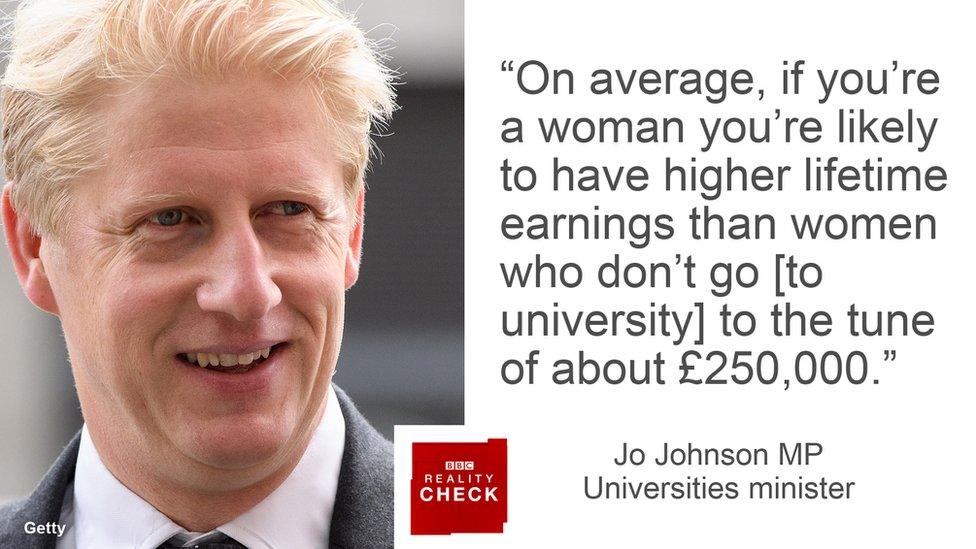Reality Check: How much more do graduates get paid?
- Published

The claim: Graduates in a lifetime earn more than non-graduates by £250,000 for women and £170,000 for men.
Reality Check verdict: Modelling lifetime earnings clearly creates uncertainties but the analysis is basically reasonable. It is an average, so there will be people for whom going to university is not financially worthwhile and some who will benefit even more.
On A-Level results day on Thursday, there was discussion on BBC Radio 4's Today programme about the value of going to university, with several figures being cited.
Universities Minister Jo Johnson said: "Universities continue to deliver extraordinary returns for people who go.
"On average, if you're a woman you're likely to have higher lifetime earnings than women who don't go to the tune of about £250,000; £170,000 if you're a man."
These figures come from analysis carried out by Prof Ian Walker and Prof Yu Zhu, external for the Department for Business, Innovation and Skills in 2013.
It estimated the value of a degree over a lifetime from the point of view of an 18-year-old, by comparing earnings for those with a degree with those for somebody with at least two A-Levels but no degree.
The figures they came up with were £252,000 for women and £168,000 for men (at 2012 prices). Those figures are adjusted for loan repayments on £9,000 per year fees and tax.
Prof Zhu told BBC News that the way the model was designed meant the increase in interest rates and fees since the research was done would be allowed for and the figures still stood.
The model also takes account of the relative likelihood of periods of unemployment during a working life.

In England, students considering university currently face tuition fees of £9,250 per year and an interest rate of 6.1% on student loans
Predicting how much people will earn in a lifetime is clearly not a precise science and there are significant uncertainties (see our previous article on the challenges of economic modelling).
Also, this is an average, so for some people it will not turn out to have been worth going to university based on the financial outcome.
Research from the Institute for Fiscal Studies, external last year found that at 23 institutions for men and nine for women, the median graduate was earning less after 10 years than the median non-graduate.
It also found that people with degrees in the creative arts earned no more on average than non-graduates.
Comparing pay
Another figure on Today came from Alistair Jarvis, chief executive of Universities UK, who said: "Somebody who goes to university will earn on average about £10,000 a year more than somebody that hasn't got a degree."
That is a figure from the Office for National Statistics (ONS) comparing median earnings for graduates with median earnings for non-graduates.
The latest figures are for 2016, external, when the average graduate earned £9,500 more a year than the average non-graduate.
It is a figure taken from the Labour Force Survey, which is the same place from where the monthly unemployment figures come.
But here's why it is not a great deal of help for somebody whose A-level results have just come out and who is deciding whether the financial commitment of going to university is a good idea.
For graduates aged between 21 and 30, the ONS figures show the earnings gap is less - at £6,000.
Also, it is not necessarily helpful to compare the earnings of graduates with all non-graduates because many non-graduates do not have the qualifications that would allow them to go to university.
And it does not take account of student loan repayments or taxes.



- Published17 August 2017

- Published17 August 2017
